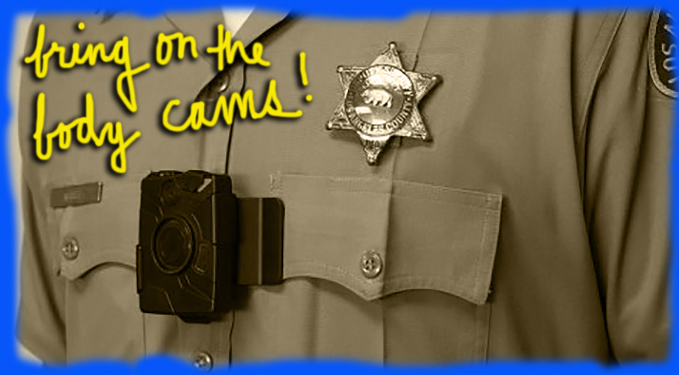
CITING RECENT EVENTS, SUPERVISORS VOTE TO PUSH FOR LASD BODY-CAMS ASAP
On Tuesday, members of the Los Angeles County Board of Supervisors voted unanimously to speed up the full implementation of body-worn cameras by LA County Sheriff’s deputies.
Although the motion, which was sponsored by Supervisors Hilda Solis and Sheila Kuehl, had been in the works for a few weeks, the events of the past week in Baton Rouge, St. Paul, and Dallas, gave Tuesday’s vote an unusual urgency.
That sense of urgency multiplied by several factors as, a few blocks away from the where the supervisors met, hundreds of demonstrators reacted to a decision by the Los Angeles Police Commission, which found that the highly controversial 2015 fatal shooting of a 30-year-old black woman named Redel Jones by an LAPD officer did not violate the department’s deadly force policy.
“Today’s action signals the Board’s commitment to making whatever investments are necessary to minimize the unnecessary loss of life and to heal tension between law enforcement and the community,” said Supervisor Solis. “Body worn cameras protect our officers and members of the public, and they must be implemented without delay….”
Co-author Sheila Kuehl, and Supervisor Mark Ridley-Thomas (who offered an amendment to the motion having to do with finding secure data storage methods) both addressed the issue directly.
“Concern about police use of force is very high,” said Kuehl. “We need to better address allegations of misconduct and increase public trust of law enforcement. I believe use of body-worn cameras will help move us in that direction,”
Ridley-Thomas was even more specific, mentioning “controversial officer-involved shootings,” including the shooting of Philando Castile in Saint Paul, MI.
“The point is,” he said, “to get to the truth and to justice. These tools will help us.”
The motion requests that Sheriff Jim McDonnell report back to the board in four months with a reasonable plan to equip all patrol deputies with body-worn cameras as quickly as possible.
DEPUTIES WANT BODY-CAMS TOO
The push is also expected to be widely welcomed by LA County deputies, as well
In September 2014, the department began an eight-month volunteer pilot program to test body cams at four LASD stations—namely, Carson, Century, Lancaster, and Temple. The program tested four brands and five models of body-worn camera systems, deploying a total of 96 cameras. Over the course of the eight months of the pilot program, the department solicited detailed feedback from the participants, through both electronic questionnaires and focus groups that were held at each of the four stations. T
The Inspector General’s office monitored the program and issued a report in September 2015.
According the report, although some of the stations were located in high crime areas, while others dealt with somewhat less intense crime levels, the feedback from the deputy participants was remarkably similar in all four stations.
All of the deputies who participated in the pilot program’s focus groups said that the body cams “would be a huge asset.” Deputies believed that the cameras would protect them from “baseless civilian complaints,” explaining that, on patrol, “you’re being recorded everywhere you go.” So having a body-worn camera would, deputies felt, more accurately document events from the officers’ perspectives.
Deputies also felt that viewing footage from an event after the fact, helped them write more accurate reports.
According to the report, a number of deputies told examiners that they missed the cams when the program was over.
ALADS, the deputies’ union, has also been vocally in favor of getting a department-wide body cam program going.
A TOOL FOR REFORM
“Video recording is a critical component of modern urban policing,” concluded the OIG in the 2015 report. “Video technology is now so advanced that it is present in almost every pocket, attached to the heads of skateboarders, and hovering above us as part of what we once called model aircraft. Failure to incorporate that technology is not just a missed opportunity, but a shortcoming that the public is increasingly unwilling to accept…”
At Tuesday’s board meeting, Inspector General Max Huntsman renewed his recommendation that the board move on the matter, ASAP.
If the board was “looking to reform the sheriff’s department,” Huntsman told the supervisors, the body cams were the best place to begin. “It’s a win-win.”
TRENDING BODY-CAMS
Not surprisingly, the push for body-worn camera gained traction elsewhere in the nation this week as Boston officials announced—also on Tuesday—that up to 100 Boston patrol officers will begin wearing body cameras likely next month, after a deal was reached between the city and the police department’s largest union to launch a six-month test of the devices.
“The agreement,” wrote the Boston Globe’s Jan Ransom, “means Boston police will join a growing number of departments across the country that have chosen to outfit their officers with cameras, at a time when controversial police shootings have prompted complaints about misconduct in several communities.”
